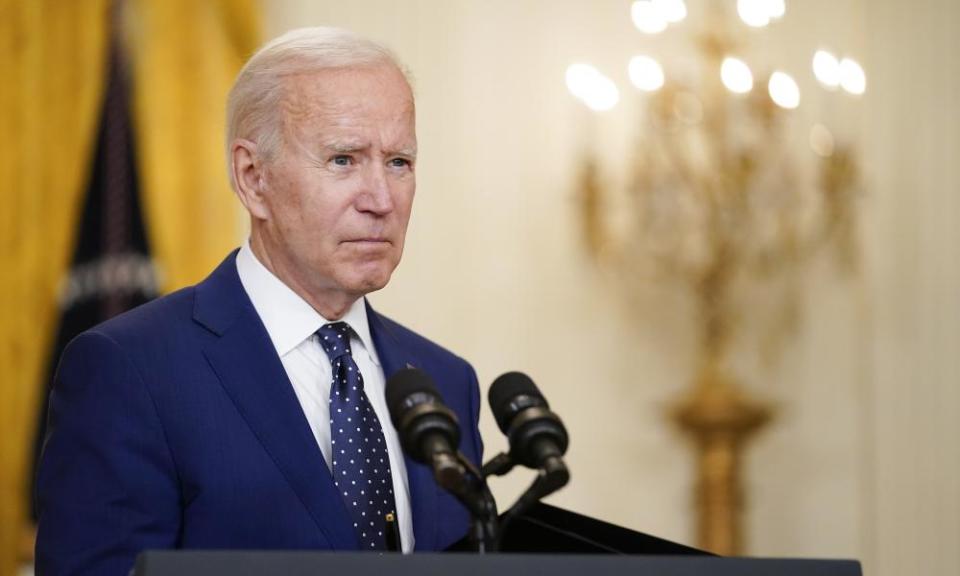The Observer view on Joe Biden’s sanctions on Russia

In one respect, the punitive measures imposed on Russia last week by the Biden administration are an attempt to clean up the mess left by Donald Trump. On issue after issue, such as Russian meddling in the 2016 and 2020 elections and cyber-attacks and hacks of US government agencies and businesses, the former president failed to take prompt retaliatory action or any action at all.
Trump cast doubt on Russia’s responsibility for these and other hostile acts, contradicting the findings of America’s intelligence agencies. He routinely declined to criticise Vladimir Putin, Russia’s president, for his support for Syria’s murderous regime, the 2018 Salisbury poisonings and the persecution of the opposition activist Alexei Navalny.
Why Trump behaved in such a fawning, servile way towards Putin, a malicious and unapologetic adversary of the US, is one of the great unsolved mysteries of his presidency. Like the mafia boss he resembles, did Putin have some kind of personal hold on Trump? Answers to this puzzle will hopefully emerge over time.
What is certain is that Joe Biden, Trump’s successor, feels no such constraints. As Barack Obama’s vice-president, Biden led a vain bid to “reset” relations with Moscow. In the process, he gained what he said was a telling insight into Putin’s “soul”. He didn’t have one, Biden told him to his face at a 2011 Kremlin meeting. Putin reportedly took this as a compliment.
Related: Biden hits Russia with new sanctions in response to election meddling
Putin is evidently less happy about the latest sanctions, which include diplomatic expulsions, measures targeting companies involved in cyber-espionage and a ban on US banks buying new Russian sovereign debt. Moscow retaliated swiftly with expulsions of its own. It accused Britain, which publicly applauded the US moves, of lamely dancing to Washington’s tune.
Explaining his action, Biden cited a long list of US grievances, most of which originated in the Trump era or before. But as Russia’s unrepentant reaction shows, it would be a mistake to think these problems belong to the past. Just as Putin tested Obama in 2014 with his illegal annexation of Crimea, for example, he now tests Biden with a renewed military build-up on Ukraine’s borders.
If anything, Putin’s behaviour, judged from a western perspective, grows more aggressive. Whether or not he invades Ukraine, or incites more separatist violence in the Donbas, he has already succeeded, to some extent, in destabilising the democratically elected government in Kiev and highlighting US-Europe divisions within Nato.
Repressive measures against the opposition network run by Navalny, who is effectively being tortured in jail, reflect Putin’s contempt for open government and human rights concerns. So, too, does his developing alliance with China’s autocratic leader, Xi Jinping, who shares his animosity to the west.
Momentum towards dangerous confrontation between the US and its allies, on the one hand, and the authoritarian Chinese and Russian regimes is undoubtedly growing. Biden faces numerous flashpoints, notably Taiwan and the Black Sea. A White House meeting with Japan’s prime minister on Friday underscored his efforts to shore up western defences.
Yet Biden is no Ronald Reagan, simplistically bent on vanquishing evil empires. Even as he punished Russia, he invited Putin to a summit on neutral ground to iron out their differences or at least defuse them. “The United States is not looking to kick off a cycle of escalation and conflict with Russia. We want a stable, predictable relationship,” he said.
At the same time, John Kerry, Biden’s climate envoy, travelled to Shanghai, seeking enhanced Chinese co-operation ahead of Biden’s global climate summit this week. Disagreements over Hong Kong and Xinjiang were temporarily set aside. Biden’s clear-eyed, pragmatic approach, though unsatisfactory in some respects, has the virtue, in theory at least, of avoiding head-on super-state collisions.
Realistically, Putin and Xi are not going to change their ways. The challenge is to find constructive means of working with them while defending western democratic values and security.

 Yahoo Finance
Yahoo Finance 